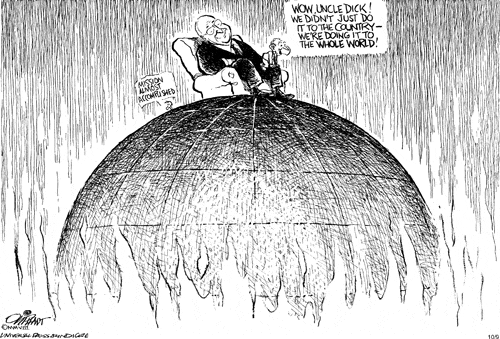PARIS — A coded French diplomatic cable leaked to a French newspaper quotes the British ambassador in Afghanistan as predicting that the NATO-led military campaign against the Taliban will fail. That was not all. The best solution for the country, the ambassador said, would be installing an "acceptable dictator," according to the newspaper.
"The current situation is bad, the security situation is getting worse, so is corruption, and the government has lost all trust," the British envoy, Sherard Cowper-Coles, was quoted as saying by the author of the cable, François Fitou, the French deputy ambassador to Kabul.
The two-page cable — which was sent to the Élysée Palace and the French Foreign Ministry on Sept. 2, and was leaked to the investigative and satirical weekly Le Canard Enchaîné, which printed excerpts in its Wednesday issue — said that the NATO-led military presence was making it harder to stabilize the country.
"The presence of the coalition, in particular its military presence, is part of the problem, not part of its solution," Sir Sherard was quoted as saying. "Foreign forces are the lifeline of a regime that would rapidly collapse without them. As such, they slow down and complicate a possible emergence from the crisis."
Within 5 to 10 years, the only "realistic" way to unite Afghanistan would be for it to be "governed by an acceptable dictator," the cable said, adding, "We should think of preparing our public opinion" for such an outcome.
Sir Sherard, as quoted, was critical of both American presidential candidates, who have vowed, if elected, to substantially increase American military support for Afghanistan to fight the Taliban.
In the short run, "It is the American presidential candidates who must be dissuaded from getting further bogged down in Afghanistan," he is quoted as saying.
On Wednesday, General David D. McKiernan, the senior American military commander in Afghanistan, called on NATO to send more troops and other support as soon as possible to counter the insurgency.
British officials said that the comments attributed to Sir Sherard were distorted and did not reflect official British policy.
"It's not for us to comment on something that is presented as extracts from a French diplomatic telegram, but the views it quotes are not in any way an accurate representation of the government's approach," said a spokeswoman for the British Foreign Office, who, like other French and British officials, spoke on the condition of anonymity under normal diplomatic rules.
The spokeswoman confirmed, however, that the two men did have a meeting, but said that the British ambassador's comments were taken out of context. But Sir Sherard, a British career Foreign Service officer who has served as ambassador to Saudi Arabia and Israel, is known for his frank talk, and other British officials who know him say that his words ring true.
Mr. Fitou, meanwhile, is considered a responsible and precise diplomat who would be unlikely to misreport a conversation, a senior French official said. The cable did not say whether the two men spoke in English or French.
French officials, who said they were deeply embarrassed about what they called a serious leak, criticized the broad dissemination of the cable and have started a leak investigation.
The senior French official described it as a "diplomatic disaster" that could put French soldiers at more risk.
Reached by telephone, Seyamak Herawy, a spokesman for President Hamid Karzai, attributed Afghanistan's problems, in part, to the "multiplicity in the viewpoints of the international community about Afghanistan."
Claude Angeli, one of the executive editors of Le Canard Enchaîné and the author of the article, defended its publication.
"This is not the first time we have been the target of a leak investigation," he said in a telephone interview. "The cable is authentic, and we reported its contents accurately."
The pessimistic British analysis comes as France has increased its troops in Afghanistan amid concern over a further erosion of popular support for French troops present there.
At the last NATO summit meeting in April, President Nicolas Sarkozy announced that he would send an additional 700 French soldiers to fight the Taliban in Afghanistan, bringing the total to about 3,000. He was criticized by the Socialist opposition, criticisms that grew louder after the deaths of 10 French soldiers in a Taliban ambush in August.
The deaths represented the highest death toll suffered by France in a military attack since the bombing of a French barracks in Beirut in 1983 that killed 58 French paratroopers.
In his cable to Paris, Mr. Fitou quoted the British ambassador as saying that the reinforcement of military troops "would have perverse effects: it would identify us even more strongly as an occupation force and would multiply the targets" for the insurgents.
The cable also quoted the British envoy as saying that despite public statements to the contrary, "the insurgency, although still incapable of a military victory, has the capacity to make life more and more difficult, including in the capital."
Acknowledging that there is no option other than supporting the Americans in Afghanistan, the ambassador reportedly added, "but we must tell them that we want to be part of a winning strategy, not a losing one." The American strategy, he is quoted as saying, "is destined to fail."

